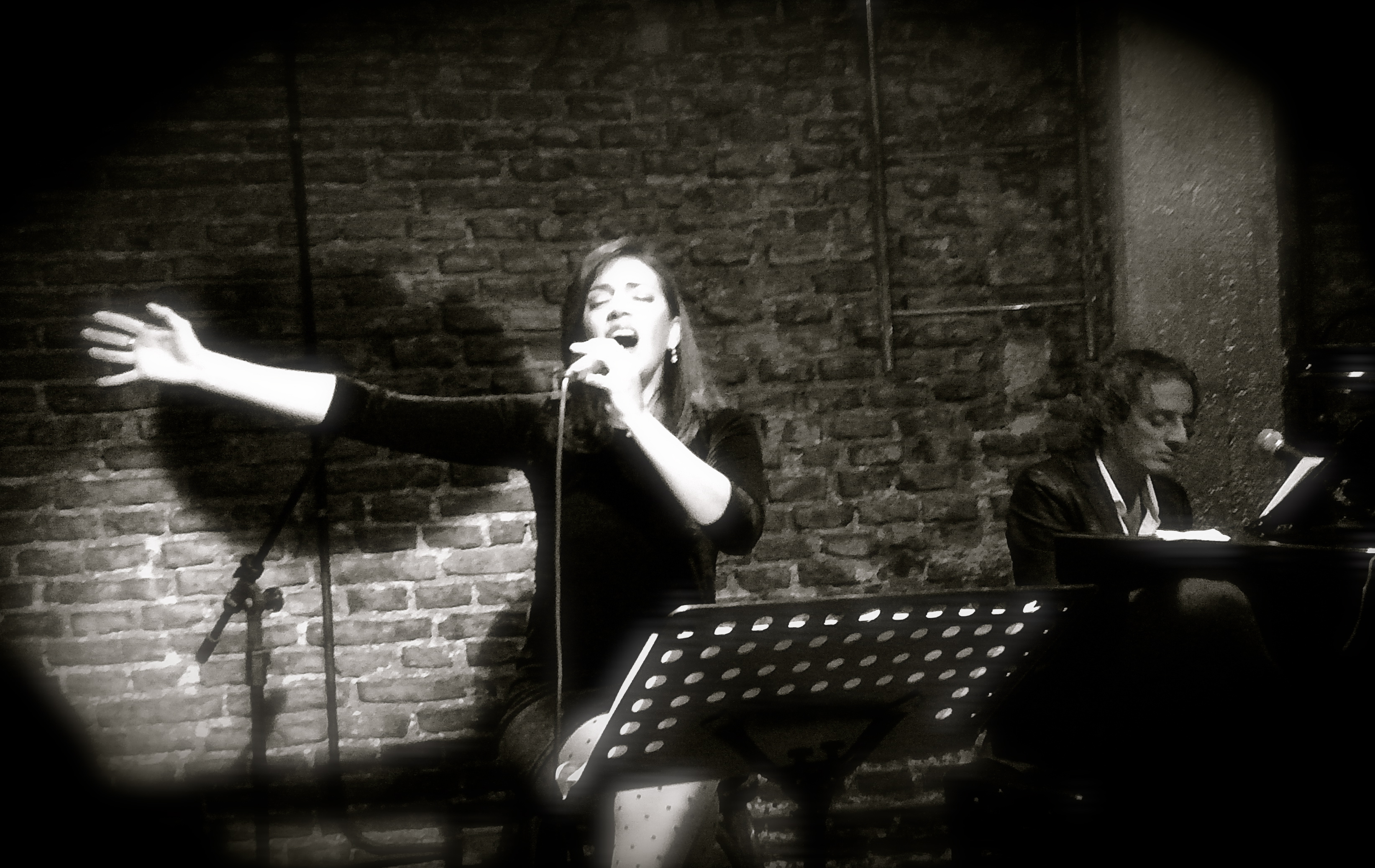I knew from seeing her a year ago that Karina Beorlegui can be streetwise and a little punky. Now I know that she can be supremely elegant. I knew that she could be tart and witty and clever. Now I know that she can be lush and suave and cosmopolitan. I knew that she was a world-maker of the most discerning sort, uniting the tango cancion and the Portuguese fado, each the child of a port city, like forgotten twins. Now I see that the land she traverses and creates is wider still, that she has peopled it with bossa nova, copla, rock, blues, folk, vals peruana, ranchera, and cabaret. I have, in short, glimpsed, in her show now running in Buenos Aires, the full dimension of her art, in which not only genre, but discipline, are categories not to be parted but paired. She is a singer – and, it may be, a great one – who brings to bear the totality of the actor’s art, of gesture, storytelling, and role-playing. She is a creature of the theater and a denizen of song, and I could not, at last week’s opening at Clásica y Moderna, get enough of her.
The show, which belongs as well to the pianist Federico Mizrahi, is named POSTALES, which means, translated, “Postcards.” This is an intriguing choice from someone so vibrantly contemporary, who honors the past, and cultures not her own, but seems not at all nostalgic or prone to exoticism. We live in an age in which real postales are largely unsent, the “post” on social media having replaced the card in the mail, with its strange postmarks, alluring stamps, and uncertain pace of delivery. So there is something in the concept of the postal that restores an element of adventure and surprise to the experience of a song. It makes us wonder how long it took to get to us, how many artists have touched it before, like tourists fingering it in the shop, how many times it has been successfully delivered. How often has it been damaged in transit, or lost altogether, what number of smeared postmarks have obscured the messages of as many senders? What new message has the artist before us written in the space provided?
On every song Beorlegui puts a stamp utterly her own. She does so while honoring, and remaining true to, its point of origin. Songs deeply known are sung as though for the first time. She is a singer polished and complete yet perpetually new, on a knife’s edge of energy and repose, fulfilling in her person the paradox of the best performers, that they be both prepared and immediate. She made, with Mizrahi at her back, Chico Buarque’s Brazilian classics “Construção” and “Deus lhe pague” (combined in a Spanish language version) into a propulsive, driving unity of lyric, voice, music and gesture. I wish I could have catalogued the shapes that her hands made in the air: sharp, elegant abstractions in precise coordination with word and note, and in the end a collapse over the stool in mock exhaustion. It was rock, jazz, and art song at once, a hypnotic cabaret of image and sound. But then something like that is true about most everything she performs, whether the copla “Tatuaje,” Chabuca Granda’s “La flor de la canela,” Violeta Parra’s “Volver a las 17,” or Caetano Veloso’s “Sou seu sabía“. They are never just songs well sung. Always there is one thing – a style, a genre, a story or conceit – that she layers onto another. Chavela Vargas’ “El ultimo trago” she sang with wine in hand, raised in a collective toast that marked as much the end of the concert as the love affair of the lyrics. When the encore came it was Joan Manuel Serrat’s “Pequenas cosas,” a song of remembered things, recalled with bitterness and sorrow, Proustian remnants found in drawers and forgotten corners.
Simply listing the songs suggests how widely travelled POSTALES is: Andalucia, Catalonia, Brazil, Chile, Perú, Mexico, Portugal, Uruguay, and, yes, Argentina, of course. There are tangos, and a couple of fados, the sister genres that Beorlegui is better than anyone at uniting. But the real energy of Postales is, one senses, in the expansion of her musical world, and, in the collaboration with Mizrahi, a particularly sharp stylistic focus. I thought her before to be an indispensable singer, if one loves the tango cancion and its Portuguese sibling, and sees singing and acting as part and parcel in a singular art. It seems to me now that she is world-class in her artistry and international in her potential. She told us at Clásica y Moderna that she would be joining the all-woman cast of Polly Ferman’s Glamour Tango for its China tour, in preparation for which she will pass through New York. If in that journey she were to perform in one of its venues, the city would be the richer for her, and she for it. She is an artist in every way consummate.
Click on Clásica y Moderna for upcoming events. For more on Karina Beorlegui, visit her here.
